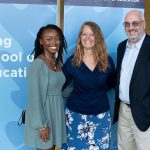In the second episode of “Worth Repeating,” UConn President Radenka Maric interviews U.S. Secretary of Education and Neag School of Education graduate Miguel Cardona about getting started as an educator, his work in the State and Federal Departments of Education, what UConn means to him, and much more.
n a lecture on Oct. 19, a leading scholar of education and law warned that allowing parents to choose to send their students to charter schools that operate without sufficient oversight will actually threaten the student’s civil rights.
“I’ve heard people make arguments about the real need for school choice,” said Preston Green III, Ed.D. He acknowledged that charter schools—a key element of school choice—can provide needed opportunities for families, but said that local governments must regulate them.
The data represents the lowest scores in 4th-grade reading since 1998 and the lowest in 8th-grade math since 2000 in the state of Connecticut.
Eric Loken, a professor at UConn’s Neag School of Education who is affiliated with the Measurement, Evaluation and Assessment program, said he considered the results to be “pretty strong evidence” of a drop in student scores. “It’s good data, and the change in it is quite dramatic,” said Loken. “This is really a data source that people tend to rely on and take as a good indicator to track performance over time.”
And if the countless issues and complaints brought up by disabled students weren’t enough to demonstrate the importance of remote learning, Nicholas Gelbar, an Associate Research Professor at the Neag School of Education, conducted a study to consolidate it even further. Gelbar’s study, published in the Journal of Postsecondary Education and Disability, surveyed students regarding the abrupt transition to online education in the spring semester of 2020. After tabulating the data collected from 340 student survey responses on personal experiences with remote learning, Gelbar concluded that “[disabled students] were able to change how they took notes, because they were able to watch an online lecture and then watch it over again.”
Chafouleas and her colleagues developed their Feel Your Best Self program to help children aged 3-12 years improve ways of relating to others as they return to the classroom post-pandemic. The program represents a partnership between Chafouleas’ group, the Collaboratory on School and Child Health, and the Ballard Institute and Museum of Puppetry, the world’s only graduate program in puppetry, both at the University of Connecticut.
As part of the 50th anniversary of Title IX, a student-athlete from the 1981 NCAA Championship field hockey team and two current women’s basketball players compare and contrast their experiences on “Hallowed Ground.”
A team of Neag School of Education researchers is developing a new initiative designed to help educators overcome language barriers to identify gifted students among English learners. Project EAGLE (Eliciting Advanced Gifted Learning Evidence) is one of several gifted education grants at UConn, including the National Center for Research on Gifted Education (NCRGE), that address inequity in schools.
Researchers from Connecticut higher education institutions are evaluating the program’s effect on attendance and other results. But interviews with families and staff members suggest a lasting impact.
On this episode, meet Del Siegle, the Lynn and Ray Neag Chair for Gifted Education and Talent Development School of Education at the University of Connecticut. Siegle is also one of the creators of the Achievement-Orientation Model, a model that explores four different elements; meaningfulness, self-efficacy, environmental perception, and self-regulation. Hear from Siegle himself about student achievement, underachievement, and the connection between the two.
For the first time since 2019, UConn’s Neag School of Education held its annual Scholarship Celebration in person to commemorate the students who have benefitted, financially and personally, from numerous donors’ generosity. Students highlighted their personal experiences and thanked the individuals who helped them turn their educational dreams into reality.

